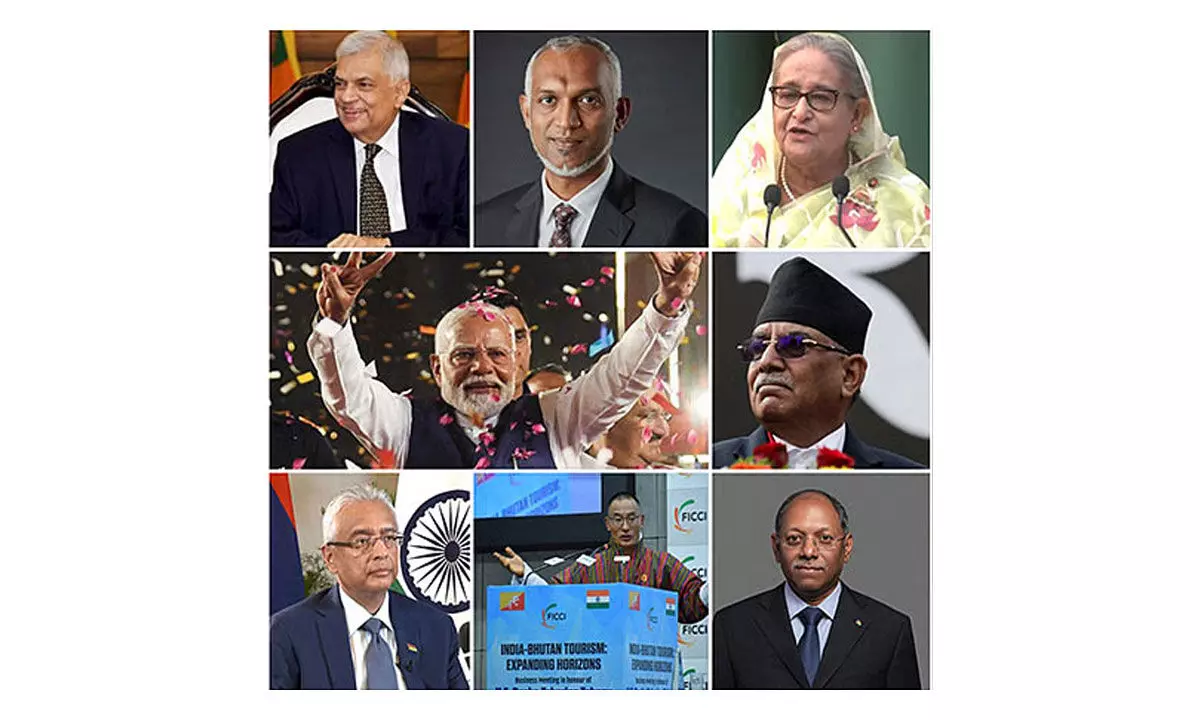Live
- Free Medical Camp Organized by Alampur Advocate Bar Association
- Allu Arjun Receives Notices from Police for Further Inquiry
- Key aide of terrorist Landa arrested by NIA from Mumbai in Punjab terror conspiracy case
- Manu Bhaker applied for Khel Ratna but was shockingly overlooked: Sources
- Jagga Reddy's 'Prajasabha' in Sangareddy Postponed
- HYDRA Commissioner Ranganath Visits ORR, Inspects Multiple Lakes
- Improvement in Sriteja's Health Condition; Ventilator Removed and Liquid Diet Administered
- Former SC judge V. Ramasubramanian appointed as NHRC Chairperson
- Shyam Benegal: A true inspiration for aspiring film-makers
- Heavy snow forecast in Japan through Tuesday
Just In
Leaders of 7 neighbouring nations grace swearing-in


The presence of leaders from the neighbourhood and the Indian Ocean region, including Bangladesh Prime Minister Sheikh Hasina and Sri Lankan President Ranil Wickremesinghe, at the inauguration of Narendra Modi’s third term as premier emphasises the importance attached by New Delhi to these countries
New Delhi: The presence of leaders from the neighbourhood and the Indian Ocean region, including Bangladesh Prime Minister Sheikh Hasina and Sri Lankan President Ranil Wickremesinghe, at the inauguration of Narendra Modi’s third term as premier emphasises the importance attached by New Delhi to these countries. Theswearing-in ceremony was also attended by Bhutan Prime Minister Tshering Tobgay, Nepal Prime Minister Pushpa Kamal Dahal, Mauritius Prime Minister Pravind Kumar Jugnauth, Seychelles Vice-President Ahmed Afif, and Maldives President Mohamed Muizzu, whose inclusion as an invitee surprised diplomatic circles in view of the currently strained ties between New Delhi and Male.
The leaders of the eight member states of the South Asian Association for Regional Cooperation (SAARC) were invited to Modi’s swearing-in in 2014, while the leaders of the members of the Bay of Bengal Initiative for Multi-Sectoral Technical and Economic Cooperation (BIMSTEC), as well as Mauritius and Kyrgyzstan, were the guests at his inauguration in 2019.
Though Bangladesh has the rare distinction of being invited to all three swearing-in ceremonies, this is the first time Hasina is representing her country – in 2014, Dhaka was represented by the parliament speaker as she was on a pre-scheduled visit to Japan, and in 2019, former president Abdul Hamid attended the event as she was on a three-nation tour.
Bangladesh occupies a special place in India’s “Neighbourhood First” policy and has benefited from billions of dollars provided by New Delhi as soft loans or grants to bolster road, rail, waterway and energy connectivity. Bangladesh recently slipped from fifth to tenth spot on the list of India’s largest export destinations, but it remains the country’s largest trade partner in South Asia.
Hasina’s government has done a lot to work with India to address security challenges related to the strategic northeastern states, including cracking down on militant groups, and Japan has aligned its development cooperation in Bangladesh with India’s connectivity initiatives.
Muizzu is on his first visit to New Delhi since coming to power in November last year on the back of an “India Out” campaign and taking a range of steps to move the Maldives closer to China in areas ranging from defence to trade. Within hours of taking the oath, Muizzu demanded the withdrawal of Indian military personnel stationed in the Maldives to operate three aircraft used for humanitarian missions. India completed the process of replacing the military personnel with civilian experts last month.
While accepting India’s invitation to attend the swearing-in ceremony, however, Muizzu said he looked forward to working with Modi to strengthen relations with India and noted that bilateral ties are “heading in the positive direction, as would be demonstrated by this visit”. External affairs ministry spokesperson Randhir Jaiswal, while announcing Muizzu’s arrival in New Delhi, said on X that “India and Maldives are maritime partners and close neighbours”.
Sri Lanka benefited from Indian aid worth nearly $4 billion, including currency support, deferred payment of loans and lines of credit to buy food, fuel and medicines, during its economic crisis in 2022, and the two sides are now working on a range of initiatives to boost financial, energy and physical connectivity.
Bhutan and Nepal are also important partners for India, especially in the context of China’s efforts to increase its influence in the region. India has ramped up energy and physical connectivity with Nepal to counter China’s efforts to implement projects under its Belt and Road Initiative. Tobgay, who was elected prime minister in January, has been crucial in stalling efforts by China to speed up the demarcation of disputed sections of the border with Bhutan – a development that could have significant ramifications for the security of the so-called “chicken’s neck” or thin sliver of territory that unites the northeastern states to the rest of India.
The External Affairs Ministry has said the visit of these leaders to attend the swearing-in is in keeping with the highest priority accorded to the “Neighbourhood First” policy and the “SAGAR” vision or Security and Growth for All in the Region. Modi is expected to hold separate bilateral meetings with the leaders.

© 2024 Hyderabad Media House Limited/The Hans India. All rights reserved. Powered by hocalwire.com






